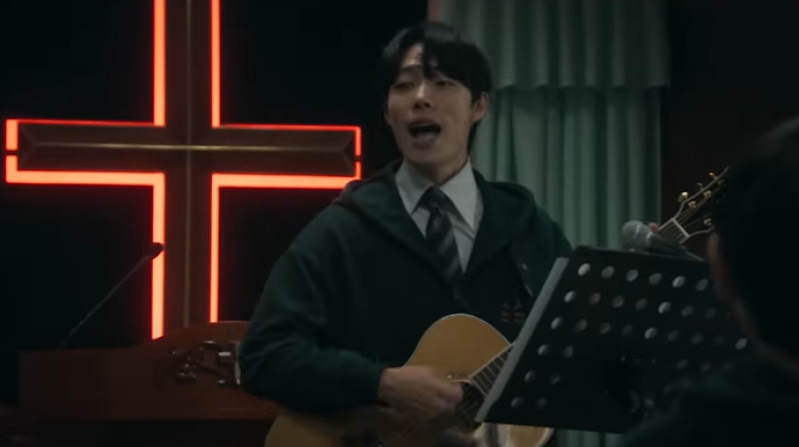
When faith turns into fanaticism, what remains of morality? Netflix’s latest thriller Revelation poses this unsettling question through a gripping story of religious corruption, divine obsession, and twisted justice. Directed by Yeon Sang-ho (Train to Busan, Hellbound) in collaboration with Alfonso Cuarón (Gravity, Roma), the film has sparked heated debates among both religious and secular audiences.
Since its March 21 premiere, Revelation has divided viewers with its unflinching critique of spiritual manipulation and the devastating consequences of unchecked belief. With a stellar cast featuring Ryu Jun-yeol, Shin Hyun-bin, and Shin Min-jae, the film unfolds a harrowing tale that exposes the darkest corners of faith and power within the church.
⚠️ This review contains minor spoilers.
A Ruthless Critique of Misguided Faith and Religious Corruption
At its core, Revelation follows the descent of a small, independent church pastor whose obsession with divine messages leads to chaos and destruction. Through this harrowing tale, the film sharply critiques misinterpretations of biblical prophecy, moral hypocrisy, and power struggles within religious institutions.
Despite its seemingly anti-Christian tone, Revelation raises thought-provoking questions that extend beyond mere criticism. The film exposes issues such as the abuse of spiritual authority, the blurred lines between devotion and personal ambition, and the church’s failure to address internal corruption. It forces viewers—both religious and secular—to confront uncomfortable truths about faith and institutional power.
A Dark and Unsettling Narrative
The story revolves around three key figures: a young pastor, a convicted sex offender, and a hardened detective. The film’s relentless tension stems from the harrowing fates of Pastor Sung Min-chan (played by Ryu Jun-yeol) and sex offender Kwon Yang-rae (Shin Min-jae), whose interactions spiral into a nightmarish descent.
For most of its runtime, Revelation maintains a heavy and suffocating atmosphere, with only a fleeting moment of relief at the climax when detective Lee Yeon-hee (Shin Hyun-bin) rescues a kidnapped girl. This momentary brightness is overshadowed by the film’s overarching theme—how distorted faith and unchecked ambition can lead to ruin.
Yeon Sang-ho is no stranger to controversial religious narratives. His previous works, The Fake (2013) and Hellbound (2021, 2024), established him as a filmmaker unafraid to scrutinize religious institutions. With Revelation, his critique reaches its peak. It is a film that Christian audiences may find deeply uncomfortable, but it also presents dilemmas that are difficult to dismiss outright.
Challenging the Notion of Divine Revelation
One of the film’s most compelling themes is the question: What constitutes true divine revelation? The narrative explores how blind faith and self-serving interpretations of prophecy can lead to catastrophic consequences.
Theologically, the film highlights how some religious leaders misuse the concept of revelation to justify personal agendas. The character of Pastor Sung Min-chan epitomizes this issue—he believes he receives divine signs through natural phenomena, such as seeing angelic shapes in the clouds. Convinced of his righteousness, he interprets these "signs" as a mandate from God to commit murder in the name of justice.
According to evangelical scholar Wayne Grudem, a proper understanding of revelation is based on three key principles:
-
No new divine revelation equals the authority of the Bible. The teachings of Jesus and His apostles completed divine revelation.
-
True revelation must align with the life-giving teachings of Christ. Any prophecy leading to harm contradicts the nature of divine guidance.
-
General revelation through nature is insufficient. While nature can indicate God’s presence, it does not provide moral directives.
By these standards, the film exposes how Pastor Sung Min-chan’s interpretation of revelation is dangerously flawed. His belief that he has received a divine command to kill directly contradicts Christian doctrine, yet his story mirrors real-world cases where religious figures have manipulated faith to justify unethical actions.
A Mirror to the Church’s Struggles
Revelation serves as a striking allegory for modern church controversies. It critiques the ease with which some leaders exploit faith for personal gain, the reluctance of churches to hold their own accountable, and the dangers of unchecked spiritual authority.
Yeon Sang-ho’s work often blurs the line between religious criticism and social commentary. While some may dismiss Revelation as anti-Christian propaganda, its themes resonate deeply with ongoing debates within religious communities. As long as religious figures continue to misuse divine authority for personal ambition, films like Revelation will keep challenging the church to confront its failings.
With its gripping narrative and bold commentary, Revelation is not just a thriller—it is a wake-up call. Whether one views it as a critique or a cautionary tale, it is undeniably a film that demands reflection.
*This article is a translated and revised version of Christian Today. Additioanlly, this column is written by Dr. Park Wook-Joo.







